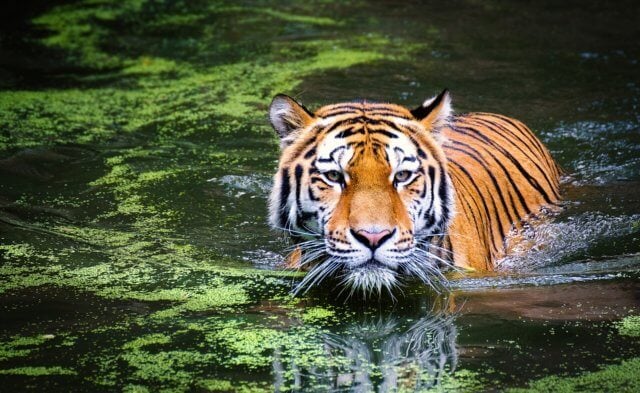Even if you don’t pay much attention to wildlife issues, most people are aware that tigers are critically endangered. As detailed in a new National Geographic exposé, there are more tigers in captivity in the United States than there are in the wild—worldwide. Roadside zoos operating as breeding mills play a huge role in creating a very real overpopulation crisis for captive tigers in America.
Tiger cubs are irresistibly adorable, which also makes them moneymakers. Sleazy roadside zoos across the country churn out cubs to exploit in “encounter” sessions and photo opportunities in which people pay to hold and be photographed with them. They’re prematurely taken away from their mothers—some just hours after birth—so they can “get used to” public interaction. The window of profitably is short since cubs quickly grow too big and strong to be “managed.” After they age out, tigers typically spend the rest of their lives in cramped cages often in deplorable conditions. They can’t be released into the wild, and all the reputable sanctuaries in the world can’t provide enough refuge for all these big cats. The heartbreaking cycle continually repeats itself.
Some roadside zoos dupe customers into believing that they’re helping to “save” endangered tigers, while others don’t even bother. Some take to the road, hauling the helpless cubs around the country on the fair circuit, stopping in shopping malls and parking lots.
Even though they appear harmless, tiger cubs are strong and have sharp teeth and claws, leading some exhibitors to take drastic action to curtail their natural instincts. One Indiana roadside zoo forcibly smacked cubs with a riding crop and told “playtime” participants to hit cubs on the nose if they got too “rowdy.” The same outfit hired a veterinarian to declaw 12 big cats, which was illegal. After the surgery, they suffered without any pain medication.
It’s deeply disturbing to imagine what happened to 23 tiger cubs who died at an Oklahoma breeding mill in one seven-month period.
Such abuse is not limited to the United States. A Canadian tiger trainer was caught on video gleefully admitting, “I like hitting him in the face.” Another was charged with cruelty to animals after a tiger and a lion were found living in a dark cage amid mounds of feces, rotting chicken parts and mud.
Tigers are apex predators. They are the largest species of cat in the world. They are strong, agile, superb hunters. They love to swim. When denied all their fundamental biological needs, they can become listless and depressed. Many pace incessantly in an effort to cope with their frustration. Others act on their natural instincts and inflict serious—often fatal—injuries on their keepers. Such acts of defiance are usually their last.
The time is long overdue for the government to impose laws restricting individuals from breeding dangerous exotic species. Until then, you can help these displaced tigers by refusing to participate in exploitative displays and by supporting reputable sanctuaries that give them refuge.






